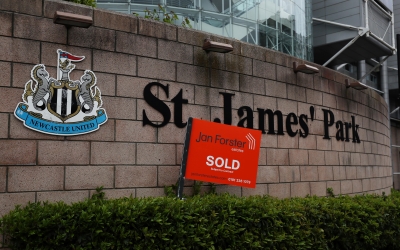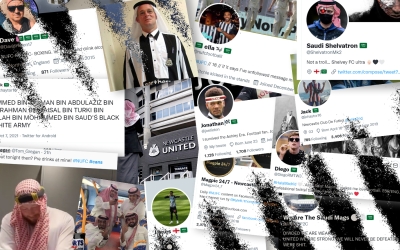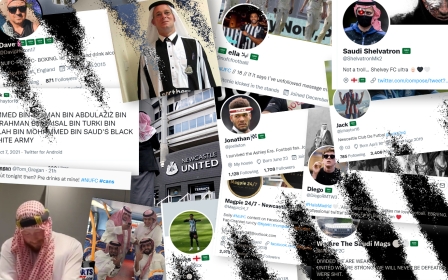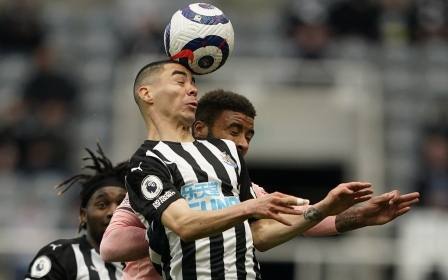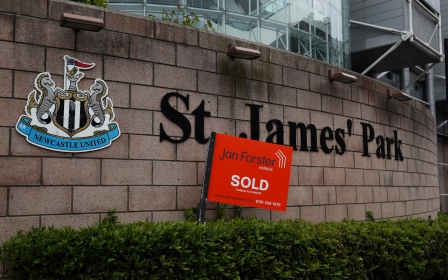Newcastle takeover: Why Qatar's beIN Sports was key to Saudi deal

Saudi Arabia made history on Thursday when its sovereign wealth fund was given the green light to buy Newcastle United Football Club.
The $390m sale put an end to the drawn-out legal battle that had previously seen the English Premier League (EPL) reject the Public Investment Fund's bid for the historic club.
The proposed takeover broke down last year over concerns about media piracy and the Saudi state owning a football club. Now the EPL claims these concerns have been addressed.
"The Premier League has now received legally binding assurances that the Kingdom of Saudi Arabia will not control Newcastle United Football Club," a statement said.
But this is a "demonstrable falsehood", Nicholas McGeehan, director of rights group FairSquare, told Middle East Eye.
"The chairman of the PIF is Mohammed bin Salman, the de-facto leader of Saudi Arabia... Any attempt to separate these two entities is preposterous."
The real reason for the takeover breakthrough lies with a Qatari sports broadcaster. Here's why.
Based in Doha, beIN Sports, which is owned and funded by Qatar, is the most popular sports broadcaster in the Middle East, spending billions to secure exclusive rights to air sporting events from across the world.
The Qatari-based media group owns the Premier League's broadcast rights in the Middle East.
Last year, Reuters reported that beIN had spent nearly $500m securing exclusive rights to broadcast games in the region between 2022-25.
Riyadh blocked beIN from broadcasting inside the Gulf kingdom after a diplomatic dispute between Saudi Arabia and Qatar in mid-2017.
The spat saw Saudi Arabia and other Gulf countries, including Bahrain and the United Arab Emirates, sever all ties with Qatar over claims it funded terrorism - a claim Doha has vehemently denied.
beIN vs beoutQ
Shortly after the dispute began in 2017, Saudi Arabia forbade the sale of beIN broadcast boxes and banned existing customers from paying their subscription to the channel.
A new website called beoutQ then appeared in Saudi Arabia, with prominent Saudis, including senior royal advisers, promoting the new network.
BeoutQ launched ten new channels and a digital box which aired football from across the world, NBA basketball, tennis tournaments and mixed martial arts from the Ultimate Fighting Competition.
The new channel, geo-locked for users in Saudi Arabia, said its backers were from a Colombian and Cuban consortium. But an investigation by the Premier League and other major sports organisations, including beIN, traced beoutQ's signal back to the Riyadh-based satellite provider ArabSat - whose largest investor is Saudi Arabia.
Saudi Arabia has denied that beoutQ was based in the Gulf kingdom, despite being widely available there.
From Doha to Tyneside
When the PIF submitted its original bid to purchase Newcastle, the Premier League was concerned that it was indirectly approving the sale of a football club to an entity accused of harming one of its major commercial partners - beIN Sports.
The EPL spent months assessing the bid via its "fit and proper test" applied to new owners.
Last year, weeks before reviewing the PIF's bid, the Premier League sent a sternly worded letter to the Office of the United States Trade Representative that accused Saudi Arabia of illegally transmitting football matches via beoutQ, and in doing so undercutting beIN.
Officials from beIN also lobbied Premier League officials and the British government not to approve the takeover after the proposed deal was made public.
In June 2020, a World Trade Organisation panel ruled in favour of Qatar and said that Saudi Arabia had breached global rules on intellectual property rights by failing to prosecute beoutQ.
A month later, the PIF withdrew its bid for Newcastle FC, citing an "unforeseen prolonged process" and global uncertainty from the coronavirus pandemic.
Even a reported call from Saudi Crown Prince Mohammed bin Salman to UK Prime Minister Boris Johnson to “correct” the EPL’s decision to block the takeover couldn't clinch the deal.
So what changed?
Then, this January, after almost four years, Saudi Arabia announced the end of the blockade of its neighbour, restoring a degree of normalcy to the relationship between the two members of the Gulf Cooperation Council (GCC).
Erstwhile rivals Mohammed bin Salman and Qatari Emir Tamim bin Hamad Al Thani embraced in the Saudi city of al-Ula and signed a "solidarity and stability" deal.
"There is a desperate need today to unite our efforts to promote our region and to confront challenges that surround us, especially the threats posed by the Iranian regime's nuclear and ballistic missile programme and its plans for sabotage and destruction," said bin Salman.
Shortly after, beIN Sports was broadcast - unofficially - in Saudi Arabia for the first time since the start of the blockade, with several cafes and restaurants in Riyadh using satellite dishes to air the EPL.
Then on Wednesday, beIN sports confirmed that Saudi Arabia was unblocking its channels in the Gulf kingdom. In a statement, the company said it had been approached by Riyadh to settle legal cases, including a $1bn investment arbitration, adding that its "singular objection" to PIF's takeover of Newcastle had been lifted.
The following day, the Premier League told journalists in a statement: "Breakthrough made after owners have finally proved to the Premier League that PIF involvement will be separate from Saudi state.”
The deal was approved despite the clear links between the Saudi state and the PIF, which was used to purchase a company that owned two private jets that transported the men who killed and dismembered Saudi journalist Jamal Khashoggi in Istanbul.
On Thursday evening, to the delight of a great many Newcastle fans, some of whom wore towels on their heads as they celebrated at St James's Park, the takeover was confirmed.
Middle East Eye delivers independent and unrivalled coverage and analysis of the Middle East, North Africa and beyond. To learn more about republishing this content and the associated fees, please fill out this form. More about MEE can be found here.


